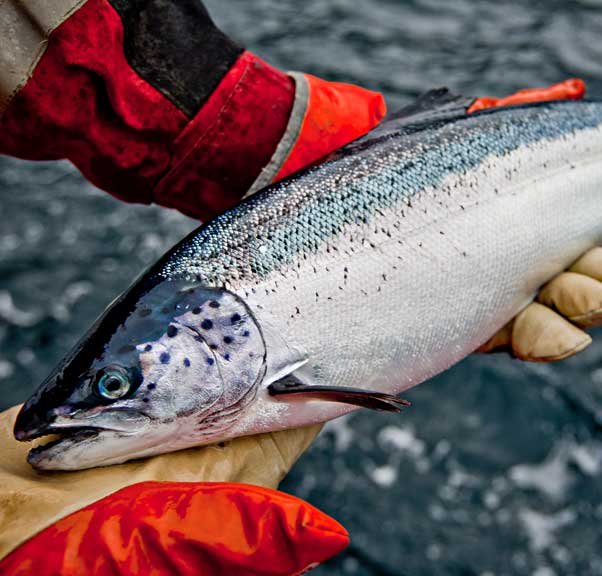Aquaculture in BC
Everyday millions of people around
the world enjoy healthy, nutritious and
delicious meals thanks to BC’s fish farmers.
Aquaculture in BC


Our Stories
Hear from today’s BC salmon farmers about about how the Salmon Farming Farming industry is raising opportunity in their communities, from Campbell River and Victoria on Vancouver Island, to Vancouver and surrounding communities in the lower mainland, all the way to Kelowna in the Okanagan!

Our Stories
Hear from today’s BC salmon farmers about about how the Salmon Farming Farming industry is raising opportunity in their communities.


Reports
Salmon farming is integrated in BC’s economy. Find out what changes to our industry can mean to communities and the people who rely on a healthy, stable aquaculture sector.

Reports
Salmon farming is integrated in BC’s economy. Find out what changes to our industry can mean to communities and the people who rely on a healthy, stable aquaculture sector.


Our Products
Just like terrestrial farmers, BC salmon farmers are proud to grow healthy, high quality food.

Our Products
Just like terrestrial farmers, BC salmon farmers are proud to grow healthy, high quality food.


Fish Health & Sustainability
Licensed veterinarians and fish health professionals are dedicated to applying best practices and the highest standards in fish health care.

Fish Health & Sustainability
Licensed veterinarians and fish health professionals are dedicated to applying best practices and the highest standards in fish health care.


Environment
Salmon farming has a low carbon footprint, high protein yield and efficient feed conversion ratio compared to other protein foods — sustainable food production into the future.

Environment
Salmon farming has a low carbon footprint, high protein yield and efficient feed conversion ratio compared to other protein foods — sustainable food production into the future.


Economic Impact
Salmon farming supports 7,000 jobs in coastal communities and contributes about $1.5 billion to the provincial economy annually.

Economic Impact
Salmon farming supports 7,000 jobs in coastal communities and contributes about $1.5 billion to the provincial economy annually.


Research & Development
BC salmon farmers invest significant resources to operate more efficiently, grow healthier fish and to better understand wild salmon populations and the marine environment.

Research & Development
BC salmon farmers invest significant resources to operate more efficiently, grow healthier fish and to better understand wild salmon populations and the marine environment.
What is aquaculture in BC?
Put simply, aquaculture in BC involves the cultivation of aquatic organisms including fish, like salmon, shellfish, and plants under controlled conditions. Given British Columbia’s vast, nutrient-rich, and biodiverse coastline, it creates an ideal environment for the aquaculture industry.
What are the advantages of aquaculture in BC?
Aquaculture in BC has numerous advantages and perhaps most significantly is its economic contribution and job creation. Aquaculture is a significant economic driver in BC, providing employment opportunities and supporting local economies. The aquaculture industry generates income through the production and sale of farmed fish, like salmon, contributing to the overall economic prosperity of coastal communities. Likewise, these coastal communities may have limited employment opportunities so creating aquaculture jobs is particularly important. For example, fisheries and aquaculture jobs are at the top of the list of job opportunities in areas like Port Hardy and Campbell River. BC’s aquaculture industry contributes to the province’s export market by selling farmed fish products internationally and is particularly important to the larger port cities like Vancouver and Victoria. Exported farmed fish and other seafood also generates revenue and strengthens trade relationships with other countries.
By creating a consistent and controlled source of high-quality fish, aquaculture in BC helps to meet the growing demand for seafood and aids in diversifying our seafood supply. Wild fish populations are under constant pressure to meet the increased global demand for seafood – aquaculture helps to alleviate this pressure by providing an alternative source of fish. With overfishing causing the depletion of global wild fish stocks, aquaculture can help to ensure a sustainable supply of seafood is met. In turn, aquaculture has the potential to have a lower carbon footprint when compared to land-based animal farming. Efficient feed conversion ratios and the ability to use waste products in a controlled environment create an advantageous, more resource-efficient farming technique.
Innovations are consistently being introduced to the world of aquaculture, and it’s an industry that encourages these technological advancements! From genetic improvements, to alternative feeds, to automated feeding systems, vaccines and health management, improvements are always being made with the goal of minimizing environmental impact and enhancing efficiency, thus leading to more sustainable and responsible aquaculture methods in BC and beyond. Aquaculture in BC stimulates research and education in this industry, like the British Columbia Centre for Aquatic Health Sciences (BC CAHS) located in Campbell River conducting research on aquatic health related to fish farming.